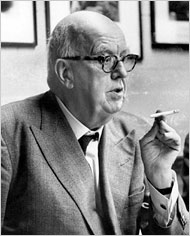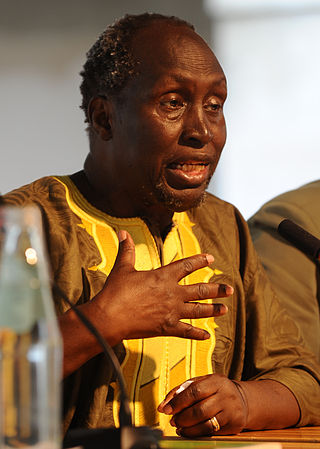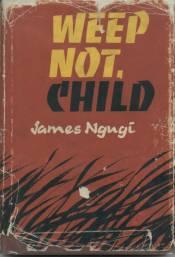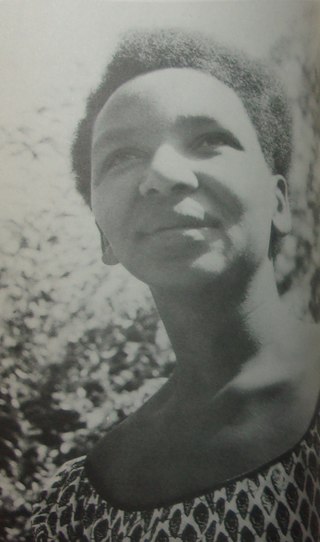Related Research Articles

Charles Percy Snow, Baron Snow was an English novelist and physical chemist who also served in several important positions in the British Civil Service and briefly in the UK government. He is best known for his series of novels known collectively as Strangers and Brothers, and for "The Two Cultures", a 1959 lecture in which he laments the gulf between scientists and "literary intellectuals".

Ngũgĩ wa Thiong'o is a Kenyan author and academic, who has been described as "East Africa's leading novelist". He began writing in English, switching to write primarily in Gikuyu. His work includes novels, plays, short stories, and essays, ranging from literary and social criticism to children's literature. He is the founder and editor of the Gikuyu-language journal Mũtĩiri. His short story The Upright Revolution: Or Why Humans Walk Upright has been translated into 100 languages.
Meja Mwangi is a Kenyan writer. He has worked in the film industry, including in screenwriting, assistant directing, and casting.

Mũkoma wa Ngũgĩ is a Kenyan American poet, author, and academic. He is associate professor of literatures in English at Cornell University and co-founder of the Safal-Cornell Kiswahili Prize for African Writing. His father is the author Ngũgĩ wa Thiong'o. His family was deeply impacted by the bloody British suppression of the Mau Mau revolution.

Kenyan literature describes literature which comes from Kenya. Kenya has a long literary tradition, both oral and written; primarily in English and Swahili, the two official languages of the country.

Weep Not, Child is a 1964 novel by Kenyan author Ngũgĩ wa Thiong'o. It was his first novel, published in 1964 under the name James Ngugi. It was among the African Writers Series. It was the first English language novel to be published by an East African. Thiong'o's works deal with the relationship between Africans and white settlers in colonial Kenya, and are heavily critical of colonial rule. Specifically, Weep Not, Child deals with the Mau Mau Uprising, and "the bewildering dispossession of an entire people from their ancestral land." Ngũgĩ wrote the novel while he was a student at Makerere University.
Simon E. Gikandi is a Kenyan Literature Professor and Postcolonial scholar. He is the Class of 1943 University Professor of English at Princeton University. He is perhaps best known for his co-editorship of The Cambridge History of African and Caribbean Literature. He has also done important work on the modern African novel, and two distinguished African novelists: Chinua Achebe and Ngũgĩ wa Thiong'o. In 2019 he became the president of the Modern Language Association.
Physician writers are physicians who write creatively in fields outside their practice of medicine.
Jonathan Kariara (1935–1993) was a Kenyan poet who wrote works including "A Leopard Lives in a Muu Tree". He was born in 1935 at the Church of Scotland Mission, Tumutumu, in Nyeri County, Kenya, in 1935.
Up to the second half of the 20th century, Tanzanian literature was primarily oral. Major oral literary forms include folktales, poems, riddles, proverbs, and songs. The majority of the oral literature in Tanzania that has been recorded is in Swahili, though each of the country's languages has its own oral tradition. The country's oral literature is currently declining because of social changes that make transmission of oral literature more difficult and because of the devaluation of oral literature that has accompanied Tanzania's development. Tanzania's written literary tradition has produced relatively few writers and works; Tanzania does not have a strong reading culture, and books are often expensive and hard to come by. Most Tanzanian literature is orally performed or written in Swahili, and a smaller number of works have been published in English. Major figures in Tanzanian modern literature include Shaaban Robert, Muhammed Said Abdulla, Aniceti Kitereza, Ebrahim Hussein, Abdulrazak Gurnah and Penina Muhando.
Bahadur Tejani is a Kenyan poet, novelist, playwright and literary critic.

Rebeka Njau was Kenya's first female playwright and a pioneer in the representation of African women in literature. Her writing has addressed topics such as female genital mutilation and homosexuality. Her first novel, Ripples in the Pool (1975), appeared as number 203 in the Heinemann African Writers Series.
The Future Leaders is a 1973 novel by Kenyan novelist Mwangi Ruheni. It was published as part of the important African Writers Series. The novel is set in Kenya before its independence from Britain, following the life events of Reuben Ruoro during the transition from colony to independent country.
David Gian Maillu is a Kenyan author and publisher. He is considered East Africa's most prolific writer, having published over 60 books between 1972 and 2021.
References
- 1 2 Simon Gikandi; Evan Mwangi (14 August 2012). "Ruheni Mwangi". The Columbia Guide to East African Literature in English Since 1945. Columbia University Press. pp. 338–339. ISBN 978-0-231-50064-7.
- 1 2 3 4 5 6 7 8 "The novelist with a phobia for publicity". The Daily Nation. 2014-01-31.